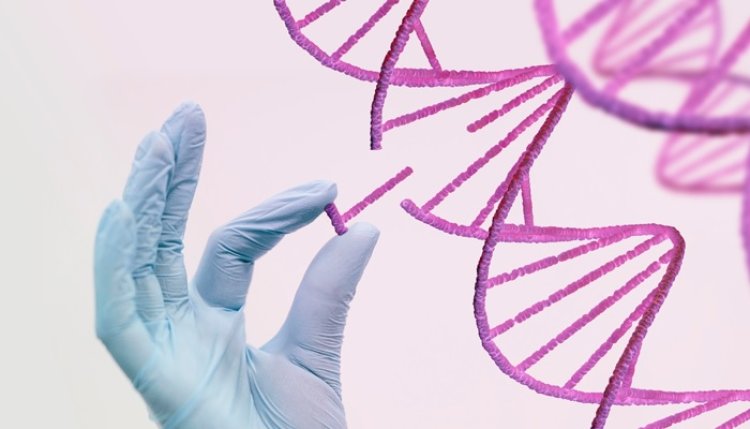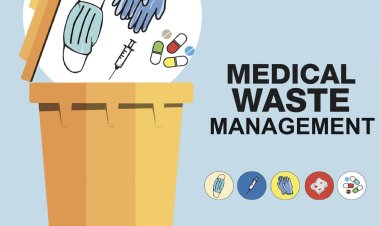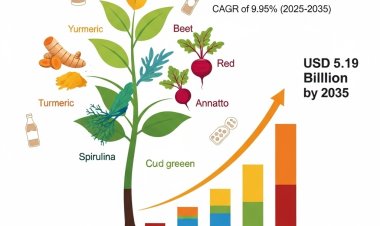Emerging Trends in the Genetic Testing Market: How Technology Is Transforming Diagnostics
Discover how genetic testing is evolving with next-generation sequencing, artificial intelligence, and personalized medicine. Learn about the latest trends and how technology is shaping the future of diagnostics in healthcare.

Genetic testing has revolutionized the world of healthcare, enabling personalized medicine and allowing patients to gain deeper insights into their genetic makeup. Over the past decade, technological innovations have dramatically expanded the capabilities and applications of genetic tests, making them more accurate, accessible, and affordable. As a result, the genetic testing market has seen tremendous growth, fueled by advancements in biotechnology, data analytics, and artificial intelligence (AI). This transformation is reshaping diagnostics, empowering patients and healthcare providers to make more informed decisions.
To understand more about Genetic Testing Market- Click for Download a Sample Report in minutes!

The Rise of Direct-to-Consumer Genetic Testing
One of the most significant trends in the genetic testing market is the rise of direct-to-consumer (DTC) genetic tests. These tests allow individuals to bypass healthcare providers and directly access genetic testing services, often with minimal upfront medical consultation. With the advent of online services such as 23andMe and AncestryDNA, consumers can now easily access tests that provide insights into their ancestry, health risks, and potential genetic predispositions to certain conditions.
DTC genetic tests have become increasingly popular due to their convenience, affordability, and accessibility. Consumers can order kits online, provide a saliva sample, and send it back for analysis. The results are often provided within a few weeks, offering a wealth of information related to personal health and genetic traits. For example, these tests can identify genetic markers linked to conditions like cystic fibrosis, sickle cell anemia, and BRCA mutations associated with breast cancer risk.
While DTC genetic tests have made genetic insights more accessible, they have also raised concerns about data privacy, accuracy, and interpretation. Some tests provide information that requires expert medical interpretation to understand fully, and misinterpretations could lead to unnecessary anxiety or incorrect medical decisions. Despite these challenges, the growth of DTC genetic testing has expanded awareness and demand for genetic insights, laying the groundwork for more sophisticated testing solutions.
Advancements in Next-Generation Sequencing (NGS)
Next-generation sequencing (NGS) is one of the most powerful technologies driving the genetic testing market forward. NGS allows for the rapid sequencing of large amounts of DNA, enabling researchers and clinicians to examine the entire genome at a much lower cost and higher speed than previous sequencing methods. This technology has significantly improved the accuracy, speed, and affordability of genetic testing.
NGS is being used for a wide variety of applications, from genetic disorder diagnosis to cancer genomics and personalized medicine. In oncology, for example, NGS allows for tumor profiling, which helps identify specific mutations in cancer cells that can guide treatment decisions. This ability to tailor treatment based on a patient’s unique genetic profile is a major step toward precision medicine.
The ability of NGS to sequence entire genomes quickly and accurately has also opened the door for new forms of prenatal genetic testing, carrier screening, and rare disease diagnostics. It is expected that NGS will continue to evolve, becoming even more affordable and accessible for a broader range of patients. This will likely drive significant growth in the genetic testing market, particularly in clinical and research settings.
Artificial Intelligence (AI) and Machine Learning in Genetic Testing
The integration of artificial intelligence (AI) and machine learning (ML) into the genetic testing process is an exciting development that is transforming the way genetic data is analyzed and interpreted. AI-powered platforms are being used to analyze vast amounts of genetic data and identify patterns that may not be immediately apparent to human researchers.
AI is being applied in several areas of genetic testing, such as:
- Genomic data interpretation: AI algorithms can analyze complex genetic data and identify genetic variations linked to specific diseases, providing more accurate diagnoses and treatment recommendations.
- Predictive modeling: Machine learning models can predict a person’s risk of developing certain conditions based on their genetic information and other factors, enabling earlier intervention and personalized prevention strategies.
- Precision medicine: AI is being used to match patients with the most effective treatments based on their genetic makeup, leading to more personalized and successful treatment plans.
- Drug discovery: AI is helping researchers identify genetic targets for drug development, speeding up the process of bringing new treatments to market.
As the use of AI and ML continues to expand, genetic testing will become more efficient and accessible, with the potential to drastically improve patient outcomes and enable proactive healthcare interventions.
Expanded Use of Genetic Testing in Oncology
The field of oncology is one of the most promising areas for genetic testing advancements. As mentioned earlier, NGS is increasingly being used for tumor profiling, which helps identify the specific mutations driving a patient’s cancer. By understanding the genetic alterations present in the tumor, oncologists can prescribe more effective and targeted therapies, which often result in better outcomes.
Liquid biopsy, which involves testing a blood sample for genetic material shed by tumors, is another area of innovation in cancer genetic testing. Liquid biopsy allows for non-invasive cancer detection and monitoring, providing a less risky and more convenient alternative to traditional biopsy methods. This technology is becoming more sophisticated, enabling early detection of cancer and continuous monitoring of treatment efficacy.
In addition to improving diagnosis and treatment, genetic testing in oncology can help with cancer risk assessment. By identifying genetic mutations such as BRCA1 and BRCA2, individuals can gain insight into their hereditary cancer risk and make informed decisions about preventive measures, such as prophylactic surgeries or increased surveillance.
As the adoption of genetic testing in oncology grows, we can expect to see more precision-driven cancer therapies and personalized care plans, improving both survival rates and quality of life for cancer patients.
Personalized Medicine and Pharmacogenomics
Personalized medicine is another emerging trend in the genetic testing market that is gaining significant momentum. Genetic tests are increasingly being used to identify the most effective treatments for individual patients based on their genetic profiles. This approach is particularly relevant in areas such as pharmacogenomics, where genetic testing is used to determine how a patient will respond to specific medications.
Pharmacogenomics involves testing an individual’s genetic makeup to predict how they will metabolize certain drugs, enabling clinicians to prescribe medications that are most likely to be effective and well-tolerated. By tailoring drug choices based on genetic information, pharmacogenomics can reduce the risk of adverse drug reactions, improve therapeutic outcomes, and optimize healthcare resources.
For example, certain genetic variations can affect how a person metabolizes drugs like warfarin (a blood thinner) or clopidogrel (a heart medication). By conducting genetic tests before prescribing these drugs, doctors can personalize treatment plans and avoid ineffective or harmful medications. Pharmacogenomics is expected to play a crucial role in the future of personalized medicine, further driving the demand for genetic testing.
Expansion of Genetic Testing for Rare Diseases
In recent years, there has been a notable increase in the use of genetic testing for diagnosing rare diseases. Genetic tests can help identify mutations in the genome that cause rare and often misunderstood conditions, such as muscular dystrophy, cystic fibrosis, and Huntington's disease. These conditions are often difficult to diagnose using traditional methods, but genetic testing can provide a clear diagnosis, leading to earlier intervention and more effective treatment options.
With the continued advancement of NGS and other genetic testing technologies, it is becoming easier to identify genetic causes of rare diseases, even in cases where a diagnosis has eluded doctors for years. The expansion of genetic testing for rare diseases is improving the quality of life for patients and their families by providing them with more accurate diagnoses and potential treatment options.
Moreover, the growth of genetic testing for rare diseases is helping researchers identify new potential drug targets and accelerate the development of treatments for these conditions.
Ethical and Regulatory Considerations in Genetic Testing
As the genetic testing market grows, so too does the importance of ethical and regulatory considerations. While genetic testing holds immense promise, it also raises a number of challenges, particularly around privacy, consent, and potential misuse of genetic data.
One key issue is the privacy of genetic data. As genetic testing becomes more accessible and widespread, there is growing concern about how personal genetic data is collected, stored, and shared. Regulatory bodies are working to establish guidelines to ensure that individuals’ genetic information is protected and used responsibly.
Another challenge is informed consent. While genetic testing can provide valuable insights, individuals must fully understand the implications of the results before undergoing testing. For example, a genetic test may reveal a predisposition to a serious disease, and individuals need to be prepared for the emotional and practical consequences of this information.
Finally, there are concerns about genetic discrimination, particularly in employment and insurance. Although laws such as the Genetic Information Nondiscrimination Act (GINA) have been enacted in many countries to protect individuals from discrimination based on genetic data, the potential for misuse remains a concern.
Conclusion: The Future of the Genetic Testing Market
The genetic testing market is on the brink of significant transformation. With ongoing advancements in next-generation sequencing, artificial intelligence, and personalized medicine, the potential for genetic testing to revolutionize healthcare is vast. As these technologies become more affordable, accessible, and accurate, genetic testing will play an increasingly important role in diagnostics, preventive care, and treatment customization.
The next few years will likely see continued growth in the market, driven by increasing awareness, better regulatory frameworks, and the integration of genetic testing into routine healthcare practices. As the market expands, new challenges will emerge, including concerns over privacy, data security, and equity in access to genetic tests. However, with careful regulation and ethical considerations, the future of genetic testing promises a world of possibilities for improving healthcare outcomes and enhancing the quality of life for individuals worldwide.
Check out Vantage Market Research's comprehensive Genetic Testing Market study for a thorough examination of industry projections, major players, and geographical trends.


















